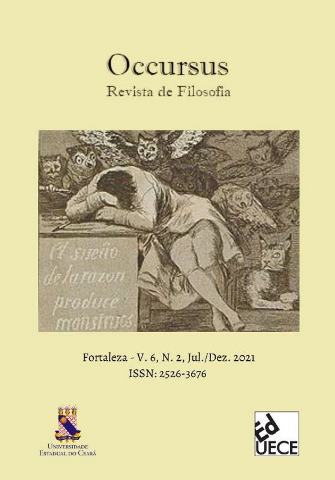Filosofia das formas simbólicas e dos jogos de linguagem: um paralelo entre o pensamento de Cassirer e Wittgenstein
Palavras-chave:
Jogos de Linguagem. Formas Simbólicas. Teoria do Conhecimento.Resumo
O conhecimento em Aristóteles se dá através do λόγος (palavra ou razão), que se expressa de forma prática ou contemplativa. Através da linguagem conhecemos o mundo, a nós mesmos e podemos agir sobre ambos. Essa ação da palavra sobre o real permitiu o desenvolvimento da teoria psicanalítica e sua cura pela fala, onde se expõe as pulsões e ao mesmo tempo se procura chegar à solução de conflitos internos do ser humano. O λόγος vai da ciência sobre a Natureza Física para a ciência sobre o νοῦς (mente ou intelecto) humano. A palavra apreende as coisas, assim como permite nos destacar do fenômeno físico estudado, trabalhar com símbolos e construir θεωρῐ́αι (teorias) com as quais observamos-entendemos o universo. Neste contexto, onde a palavra é vista com importância fundamental, a Filosofia da Linguagem nos permite pensar sobre as bases de nosso conhecimento. As formas simbólicas e as linguagens ganham dimensão de transformação prática e ativa, pois a ação é o requisito básico para a construção do πόλῐς (Estado). O presente ensaio tem como objetivo dissecar e confrontar os conceitos chaves em linguagem, trazidos pelos filósofos Ernest Cassirer e Ludwig Wittgenstein, a saber, a Filosofia das Formas Simbólicas do primeiro, e os Jogos de Linguagem do segundo. O confronto nos permite entender melhor a visão de ambos e a sua contribuição para a Filosofia da Linguagem e a Teoria do Conhecimento.
Referências
ARISTÓTELES. Ética a Nicômaco. Coleção Os Pensadores: Aristóteles, Nova Cultura, 4a. edição, pp. 121-127, ISBN: 85-13-00214-3, 1991.
ARISTÓTELES. Política. Edipro, 1. ed., p. 352, ISBN-13: 978-85521003555, 2019.
AZEVEDO JÚNIOR, Ivan L. Palestra do professor doutor Azevedo Junior sobre Antropologia Filosófica em Cassirer. Universidade Estadual do Ceará, Fortaleza, Ceará, em 12 de Dezembro de 2020.
BOTTER, B. Ética II. Vitória: Universidade Federal do Espírito Santo, Secretaria de Ensino a Distância, 2016.
FREUD, S. As pulsões e seus destinos. Belo Horizonte: Autêntica, 1. ed., ISBN-13: 978-8582173169, 2013.
HOLST, B.; NUNES, M. L. T. Contribuições de Sabina Spielrein à Psicanálise. Revista Barbarói, Departamento de Ciências Humanas, Universidade de Santa Cruz do Sul, n. 37, pp. 138-153, 2012.ISSN: 1982-2022. Disponível em: <https://online.unisc.br/seer/index.php/barbaroi/article/view/2809/2360>. Acesso em: 24 de março de 2021.
LIMA VAZ, Henrique C. Antropologia filosófica. São Paulo, Loyola, 1991. MARCUSE, Herbert.O Homem Unidimensional. São Paulo: Edipro, 2015.
SUPERINTERESSANTE. Koko, a gorila que fala. 2019. Disponível em: <https://super.abril.com.br/ideias/koko-a-gorila-que-fala/>. Acesso em: 24 de março de 2021.
VENÂNCIO, Rafael D. O. O jogo de linguagem: Wittgenstein, Teoria dos Jogos e Comunicação Social. Amazon Serviços de Varejo do Brasil, 2017.
Downloads
Publicado
Como Citar
Edição
Seção
Licença

Este trabalho está licenciado sob uma licença Creative Commons Attribution 4.0 International License.




